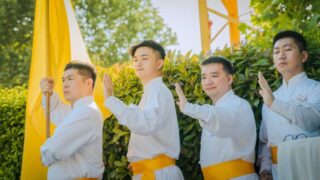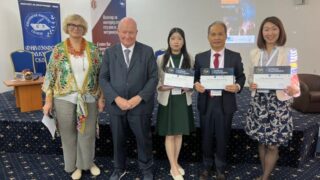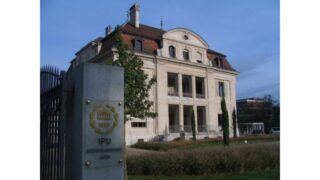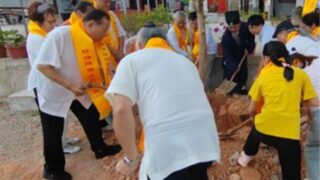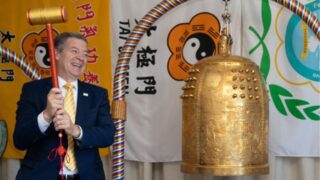A special session of the world’s largest inter-religious gathering spread the awareness of the injustice vested on Tai Ji Men.
by Massimo Introvigne


The Parliament of the World’s Religions was first held in Chicago in 1893 and is both the oldest and largest inter-religious gathering in the world. The 2023 edition, attended by more than 7,000 participants from all continents and faiths, was organized again in Chicago, with the general theme “A Call to Conscience: Defending Freedom of Human Rights.”
Tai Ji Men puts conscience at the center of its teachings and path, and it was especially appropriate to discuss its struggle for conscience and justice during the Chicago gathering.
On August 15, a session of the Parliament was devoted to “Tai Ji Men’s Journey: A Fight for Conscience and Justice.” It was chaired by me and opened by Tai Ji Men’ Shifu (Grand Master), Dr. Hong Tao-Tze. He said that all genuine religions help us awaken our innate conscience and, thus, perform good deeds, which in turn lead to a happy life. This is the essence of Tai Ji Men, which awakens conscience through self-cultivation, and the practice of qigong. Disciples and those who participate in events Dr. Hong has organized in more than 100 countries thus learn that conscience is the ultimate compass of our life. It indicates truth and justice, and allows us to overcome evil and persecution, of which Tai Ji Men has unfortunately a very direct experience.
Continuing the conversation about conscience, I discussed how conscience, as the still small voice that tells us that a certain behavior is wrong, was taken for granted for centuries and not regarded as in need of being defended. However, in the 19th century three ideologues whom French philosopher Paul Ricœur called “the masters of suspicion,” Karl Marx, Friedrich Nietzsche, and Sigmund Freud, argued that what we call the voice of conscience is not innate but has been put into our consciousness by capitalism, religion, or society. The way of answering the ideologues, I argued, is precisely what Dr. Hong teaches, that conscience is basically simple, is innate, and we may all perceive its voice easily.
Rosita Šorytė, from the European Federation for Freedom of Belief, noted that both Qigong and the similar Japanese technique called Reiki have been attacked by “anti-cultists” in several countries as “pseudo-sciences” and “cultic deviances.” In fact, they are simply based on the old teaching that a universal energy flows both into the macrocosm, the universe, and the microcosm, the human body. Šorytė quoted Taoist classics to the effect that the good circulation of this energy, called “Chi,” guarantees both social harmony and personal health. Taoist masters, Šorytė said, taught that techniques favoring the circulation of “Chi” can never be separated from a good life. This is what Dr. Hong teaches, she noted, and wondered why those who help humanity and teach sound principles are often persecuted. This happens, Šorytė suggested, because they guide humans to think independently, something obtuse bureaucrats and corrupt politicians never like.


Linda Chen, a researcher in the biomedical field at Dalhousie University, Halifax, Nova Scotia, Canada, reported how her own journey as a Tai Ji Men dizi started when she watched in 1999 a video where Dr. Hong invited representatives of different religions to pray after a devastating earthquake hit Taiwan. The video made her understand how different religions can cooperate based on the common values of conscience and promote peace and love. She decided to devote herself to this worthy cause, and participated with Dr. Hong in several events and initiatives, including the Movement of an Era of Conscience, which was instrumental in adding April 5 as the International Day of Conscience to the list of United Nations days of observance.
Liu Yin-Chun, the managing director of a biotechnology company in the Netherlands, offered a summary of the Tai Ji Men case. Tai Ji Men, she said, was among the victims of a politically motivated crackdown that in 1996 hit spiritual movements accused of not having supported the ruling party in that year’s presidential elections. Although in 2007 the Supreme Court of Taiwan declared Tai Ji Men innocent of all charges, including tax evasion, the National Taxation Bureau continued to issue ill-founded tax bills. Based on one of these, in 2020 it seized, auctioned off, and confiscated sacred Tai Ji Men land intended for a self-cultivation center and educational institutions. Tai Ji Men dizi (disciples) regard this action as unjust and contrary to the 2007 Supreme Court verdict, Liu said, and want their sacred land back. They are supported by prominent international scholars and human right activists, she concluded, and hope the 2023 Parliament of World’s Religions will be the opportunity to add new supporters to what is already a long and significant list.


Another dizi, Lynn Lin, reported how the teachings of Dr. Hong inspired her to resist persecution and adversity. She was particularly touched by Dr. Hong’s statements that Tai Ji Men “resolves adversity with unwavering courage, much like a sword forged in the heat of challenges.” She also mentioned that in 2009 Taiwan, although not a member of the United Nations, incorporated the two main UN human rights covenants into its domestic law. However, in the Tai Ji Men case the National Taxation Bureau and other authorities completely ignored the provisions of the International Covenant on Civil and Political Rights on freedom of religion or belief, and the prohibitions against seizing or confiscating properties intended for spiritual activities and again arbitrary deprivation of property, she said.


Clare Huang, a graduate student in epidemiology at Harvard University, added that during the 27 years of the Tai Ji Men case Dr. Hong was repeatedly invited to settle with the National Taxation Bureau through some compromise. He always refused for a reason of principle and conscience. The core of the Tai Ji Men case is the 2007 Supreme Court decision that clearly stated that there was no tax evasion and no violation of tax laws. Any compromise or settlement would implicitly deny this verdict and thus the truth. What she learned from her Shifu, Huang said, is to put her trust not in legal technicalities but in conscience and the cultivation of a pure heart.


Li Tin-Yung, a recent graduate from Taipei Medical University, reported how just before her graduation she traveled with Dr. Hong to Sweden, Turkey, Washington DC, and India to attend various events and promote the message of peace, love, and conscience. For Tai Ji Men dizi, these trips are always the opportunity of unexpected and moving experiences. She told the story of how she wept together about the war in Europe with a grandmother of Ukrainian descent at Union Station in Washington DC, to whom she had proposed to sign the Declaration for the Movement of an Era of Conscience. Li also insisted on the special and sacred importance of the land confiscated from Tai Ji Men, which made what happened in 2020 even more painful and unjust.


Joyce Huang, a sophomore majoring in Digital Technology Design at the National Taipei University of Education, reported her experiences as a dizi specialized in modern technologies. To her surprise, a video she prepared on tax reform reached three million views within a week. A different but important experience for her was participating in 2022 in the 25th Eurasian Economic Summit in Istanbul, Türkiye. One memorable moment was when dizi gathered in the square outside the famous Topkapi Palace and sang and danced with passers-by. “Love knows no boundaries,” she said. She added, however, that love also demands that we fight for justice when needed. Huang reminisced how she was there during the fateful day of the illegal auction of Tai Ji Men’s sacred land. Although the experience was a sad one, Huang is confident that in the end education to conscience would lead to the appropriate tax and legal reform in Taiwan and a fair solution of the Tai Ji Men case.


An audience of people of all religions participated in the event. More and more scholars, human rights activists, and religious leaders from all continents are becoming aware of the Tai Ji Men case and offer their support to Shifu and dizi. It is great time for the government of Taiwan to also take notice—and solve the case.





